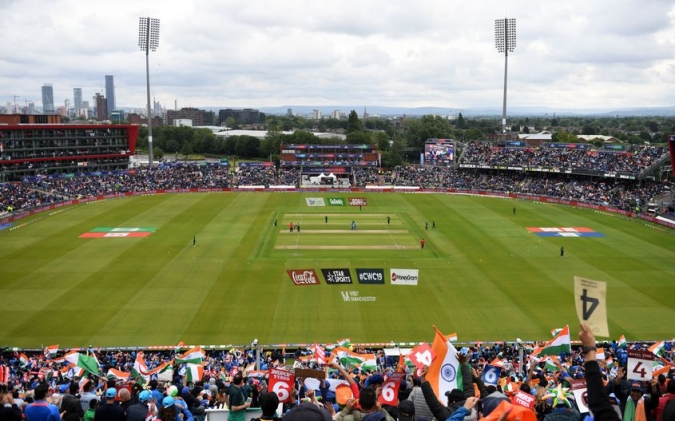- One of cricket’s biggest rivalries was renewed as India and Pakistan met in Manchester
- India prevailed on the pitch as fans of both sides provided an atmosphere to savour
There was only one Old Trafford on Manchester’s lips, and it wasn’t the place made famous by Ryan Giggs, George Best and David Beckham, before the most eagerly-awaited game of the ICC Men’s Cricket World Cup so far.
Tickets for the meeting between India and Pakistan were applied for in the region of 800,000 – enough people to fill the football stadium more than ten times over.
Supporters of both sides came from far and wide to see the latest instalment of one of sport’s biggest rivalries with India seeking to add to their 6-0 lead in World Cup head-to-heads.
But however deep the passion and pride, fans were able to mix outside the ground and in the stands, where the onus was on a memorable day out as well as the two points for victory.
India supporter Amit Ray had flown from New Jersey in the United States on Saturday, and was due to return on Monday after experiencing his fourth World Cup.
“To some people, winning this game is bigger than winning the tournament,” he said. “But I think most of us have moved on from that nowadays. While it means the world to win, India’s long winning streak against Pakistan at World Cups means we can see the bigger prize.”
Najeeb Ahmed, a Pakistan fan, undertook a 12-hour journey with family and friends from Frankfurt in Germany and was facing a long night travelling back to mainland Europe before returning to work on Monday.
He said: “It is a battle, but a friendly battle, like rivalry between siblings. Whoever we support, we love each other so there is a common bond, and that common bond is cricket. Having said that, I’d love to win.”
Gaurav Pandey, from Kolkata, chose a different comparison. “I think of it as similar to a big football derby, say Liverpool and Everton or City and United in Manchester,” he explained. “We have a long history of rivalry and it means a lot to win, but as supporters we don’t hate each other. It isn’t war, it’s a game of cricket.”
Pandey was certainly taking the advice of Virat Kohli in the build-up and soaking in the special atmosphere. So were those whose shorter journeys could be measured in miles rather than countries and continents.
Usman Ditta, from Manchester, said: “I’d love Pakistan to win, but you have to appreciate good cricket and if Kohli had scored a hundred… well, that would have been great to watch.
“I have a lot of Indian friends. We have banter about the game and we will do depending on the result, but it is just that – not nasty or offensive. It never gets personal.
“One reason for the game being so important is that India and Pakistan don’t play each other very often. It’s a shame they don’t, say, play a five-match series in England every year. Demand would be huge.”
Manchester proved an ideal location. It is well-known for its cosmopolitan culture and the value of its global population.
Among exhibits at the People’s History Museum just off busy Deansgate are passports of Pakistani immigrants to the city in the 1960s. Nearby, at the Royal Exchange Theatre, the current production is a revival of Hobson’s Choice, by Harold Brighouse, set among the Indian rag trade in Manchester during the time of Margaret Thatcher.
It is cricket boosting the local economy now. Hotels were long full and breakfast at one, near trendy Salford Quays, brought forward breakfast by an hour to 6.30am because guests wanted to leave early for the 10.30 start.
Two hours before play, the roads and pavements were already bustling. A group of Pakistan fans, painted and clothed in green and white, hired a spectacular double-decker bus to get to the ground. When it was forced to halt on Warwick Road, India supporters in blue replica shirts leapt in front for selfies.
Flags, horns, colour, noise. Scenes recalled the memorable final morning of the Ashes Test at the same venue in 2005 as thousands of people milled outside the gates, excited, expectant, anticipating a famous game ahead.
Nobody there will forget that day. They won’t this time either.
Courtesy: ICC




